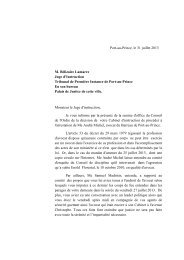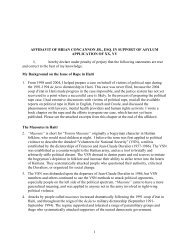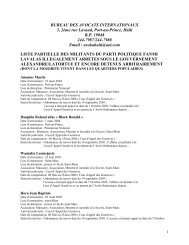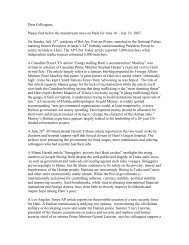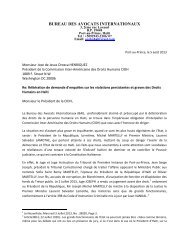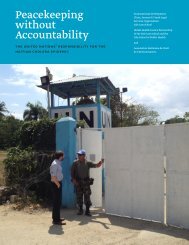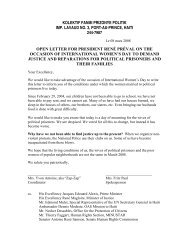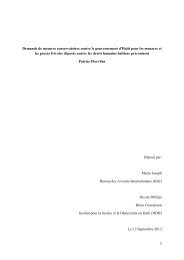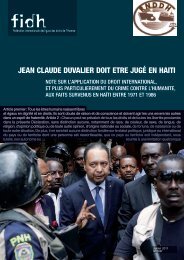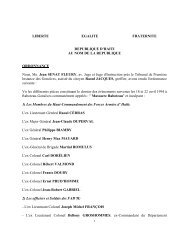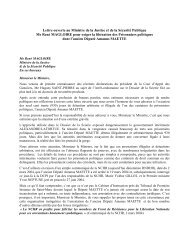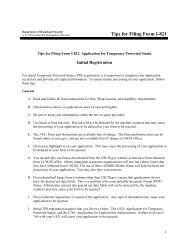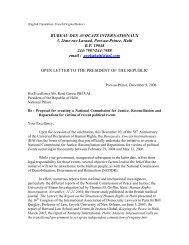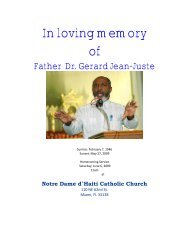Elections-Process-6 - Institute for Justice and Democracy in Haiti
Elections-Process-6 - Institute for Justice and Democracy in Haiti
Elections-Process-6 - Institute for Justice and Democracy in Haiti
Create successful ePaper yourself
Turn your PDF publications into a flip-book with our unique Google optimized e-Paper software.
<br />
The International Community Should Pressure the <strong>Haiti</strong>an Government<br />
For Prompt <strong>and</strong> Fair <strong>Elections</strong><br />
June 30, 2010<br />
I. Introduction<br />
On June 28, 2010, <strong>Haiti</strong>an President Renée Préval announced Parliamentary <strong>and</strong> Presidential<br />
elections <strong>for</strong> November 28, 2010, <strong>and</strong> issued a decree m<strong>and</strong>at<strong>in</strong>g that the country’s n<strong>in</strong>emember<br />
Provisional Electoral Council plan <strong>for</strong> the elections. 1 These upcom<strong>in</strong>g elections will<br />
provide the political foundation <strong>for</strong> effective use of earthquake response funds <strong>and</strong> the<br />
development of a stable society that will be less vulnerable to future natural disasters. The<br />
Government of <strong>Haiti</strong> (GOH) must stick to its deadl<strong>in</strong>e, but it must also run fair, <strong>in</strong>clusive <strong>and</strong><br />
constitutional elections.<br />
These elections are particularly important to:<br />
a) re-establish an effective legislature that can make the vital national policy decisions<br />
entrusted to it by <strong>Haiti</strong>’s constitution;<br />
b) establish political accountability <strong>for</strong> the expenditure of large amounts of money that<br />
will have a last<strong>in</strong>g impact on <strong>Haiti</strong>an society; <strong>and</strong><br />
c) resolve <strong>Haiti</strong>’s current societal disputes <strong>in</strong> a peaceful <strong>and</strong> democratic manner.<br />
The failure to hold credible elections will perpetuate the social unrest <strong>and</strong> political uncerta<strong>in</strong>ty<br />
that made <strong>Haiti</strong> vulnerable to the earthquake’s damage, <strong>and</strong> slow to mount an effective<br />
governmental response. 2 The <strong>in</strong>ternational community, <strong>in</strong> order to protect its <strong>in</strong>vestment <strong>in</strong><br />
<strong>Haiti</strong>’s reconstruction <strong>and</strong> facilitate the emergence of a democratic, stable government <strong>in</strong> <strong>Haiti</strong>,<br />
must use the leverage that its f<strong>in</strong>ancial contributions to reconstruction provide to ensure the<br />
hold<strong>in</strong>g of fair, <strong>in</strong>clusive <strong>and</strong> constitutional elections.<br />
<strong>Haiti</strong> currently faces three pr<strong>in</strong>cipal problems relat<strong>in</strong>g to elections:<br />
a) the clos<strong>in</strong>g of Parliament when members’ terms expired <strong>in</strong> May 2010;<br />
b) a credibility crisis <strong>for</strong> the 1/3 of the Senate elected <strong>in</strong> flawed elections <strong>in</strong> 2009 <strong>and</strong> of<br />
the Electoral Council that ran the elections; <strong>and</strong><br />
c) the threat that the Executive Branch will have no Constitutional legitimacy after<br />
February 7, 2011.<br />
<strong>Haiti</strong>’s Constitution set elections <strong>for</strong> all 99 seats <strong>in</strong> the Chamber of Deputies <strong>and</strong> 10 of 30 seats<br />
<strong>in</strong> the Senate <strong>for</strong> November 2009. The Provisional Electoral Council (Conseil Electoral Provisoire,<br />
<br />
1 Presidential <strong>Elections</strong> Set <strong>for</strong> November 28, JAMAICA OBSERVER, June 27, 2010, available at<br />
http://www.jamaicaobserver.com/news/Presidential-elections-set-<strong>for</strong>-November-28.<br />
2 Brian Concannon Jr. & Ira Kurzban, Don’t Honor Ta<strong>in</strong>ted Election, MIAMI HERALD, Dec. 11, 2009, available at<br />
http://www.miamiherald.com/2009/12/11/1376563/dont-honor-ta<strong>in</strong>ted-election.html.<br />
PO Box 52115 • Boston, MA 02205-2115 • (617) 652-0876 • <strong>in</strong>fo@ijdh.org • www.ijdh.org
or CEP) named by President Préval to conduct those elections was not established until<br />
October 16, 2009. The CEP quickly scheduled elections <strong>for</strong> February <strong>and</strong> March 2010, but<br />
those were postponed after the earthquake. The Constitution also requires Presidential<br />
elections <strong>in</strong> November 2010. Be<strong>for</strong>e it was rendered non-functional, Parliament granted<br />
President Préval’s request authoriz<strong>in</strong>g him to rema<strong>in</strong> <strong>in</strong> office <strong>for</strong> three months beyond his<br />
term <strong>in</strong> case no elections take place by February 2011. 3<br />
II. Miss<strong>in</strong>g Branch<br />
<strong>Haiti</strong>’s 1987 Constitution establishes a bicameral legislature or Parliament, composed of a<br />
Senate <strong>and</strong> a House of Deputies, as one of the three branches of government, along with the<br />
judiciary <strong>and</strong> the executive branch. The Constitution entrusts the legislature with many<br />
important tasks, <strong>in</strong>clud<strong>in</strong>g confirm<strong>in</strong>g <strong>and</strong> dismiss<strong>in</strong>g the Prime M<strong>in</strong>ister <strong>and</strong> Government,<br />
ratify<strong>in</strong>g all <strong>in</strong>ternational agreements, vot<strong>in</strong>g laws <strong>and</strong> determ<strong>in</strong><strong>in</strong>g the national budget. This<br />
essential part of <strong>Haiti</strong>’s government has been unable to function s<strong>in</strong>ce May 8, 2010, when the<br />
terms of all 99 members of the House of Deputies <strong>and</strong> 1/3 of the Senate expired without the<br />
hold<strong>in</strong>g of new elections.<br />
The absence of a Parliament is especially important now, when important decisions about<br />
<strong>Haiti</strong>’s future are made <strong>in</strong> the context of the national <strong>and</strong> <strong>in</strong>ternational response to <strong>Haiti</strong>’s<br />
earthquake. Some important actions will be simply impossible to take; others will be taken by<br />
the Executive Branch, but are subject to challenge as unconstitutional. Perhaps most<br />
important, the vital role that the Constitution gives the legislature of balanc<strong>in</strong>g executive<br />
power is now unfulfilled, when it is needed most.<br />
III. Credibility Crisis<br />
<strong>Haiti</strong>’s CEP, <strong>and</strong> consequently the c<strong>and</strong>idates elected <strong>in</strong> its elections, suffer from a lack of<br />
credibility because: a) the CEP was established through a process not recognized by the<br />
Constitution; b) a predecessor CEP, <strong>in</strong>clud<strong>in</strong>g most of the current members, improperly<br />
excluded all c<strong>and</strong>idates from <strong>Haiti</strong>’s largest political party, Fanmi Lavalas (FL) from Senatorial<br />
elections <strong>in</strong> 2009; <strong>and</strong> c) it announced the exclusion of 16 political parties from elections<br />
announced <strong>for</strong> February <strong>and</strong> March 2010.<br />
A. April 2009 <strong>Elections</strong><br />
On April 19, 2009, <strong>Haiti</strong> held elections <strong>for</strong> 12 of the 30 seats <strong>in</strong> the Senate. The Provisional<br />
Electoral Council (CEP) orig<strong>in</strong>ally approved FL as a party, but excluded every FL c<strong>and</strong>idate<br />
from tak<strong>in</strong>g part <strong>in</strong> the April 2009 vote. Two separate groups of FL submitted lists of<br />
c<strong>and</strong>idates, as representatives of separate FL factions, but the CEP rejected the submissions.<br />
When the factions then jo<strong>in</strong>tly submitted one list of c<strong>and</strong>idates, the CEP further required an<br />
orig<strong>in</strong>al signature (non-facsimiled) from party leader <strong>for</strong>mer President Jean-Bertr<strong>and</strong> Aristide.<br />
The CEP created this new requirement know<strong>in</strong>g that President Aristide was <strong>in</strong> exile <strong>in</strong> South<br />
Africa <strong>and</strong> would be unable to deliver it.<br />
<br />
3 President Préval claims that while <strong>Haiti</strong>’s constitution says a president must depart from office on February 7, 2011, it<br />
also states that a president must serve five years. Because of delays <strong>and</strong> controversy <strong>in</strong> the 2006 presidential elections,<br />
President Préval did not come <strong>in</strong>to power until May 14, 2006. Under the proposal, President Préval would rema<strong>in</strong> <strong>in</strong><br />
office until his successor is elected, but no later than May 14, 2011. See, Jacquel<strong>in</strong>e Charles, <strong>Haiti</strong>an President René Préval<br />
asks to rema<strong>in</strong> <strong>in</strong> office, MIAMI HERALD, May 5, 2010, available at http://www.miamiherald.com/2010/05/05/1615553/<br />
haitian-president-rene-preval.html#ixzz0nBLxiX2G.<br />
PO Box 52115 • Boston, MA 02205-2115 • (617) 652-0876 • <strong>in</strong>fo@ijdh.org • www.ijdh.org 2
The CEP’s exclusion of FL was not justified under <strong>Haiti</strong>an law. The CEP’s m<strong>and</strong>ate does not<br />
give it authority to exclude legally recognized political parties, such as FL. Moreover, if the two<br />
groups claim<strong>in</strong>g to be FL tried to register <strong>for</strong> the elections, a more fair remedy would have<br />
been <strong>for</strong> the CEP to decide which groups was the representative of the party the Council had<br />
accepted <strong>for</strong> registration, rather than exclud<strong>in</strong>g both groups. Otherwise, any party could get<br />
pushed off the ballot by a group of people fil<strong>in</strong>g a duplicate set of c<strong>and</strong>idates.<br />
Instead, the CEP effectively silenced <strong>Haiti</strong>’s largest political party that was critical of President<br />
Préval’s government. FL has won every election it has contested, <strong>in</strong>clud<strong>in</strong>g 90% of the seats <strong>in</strong><br />
the 2000 parliamentary elections.<br />
FL challenged the CEP’s exclusion <strong>in</strong> court. The leader of the UN Security Council delegation,<br />
Jorge Urb<strong>in</strong>a, applauded FL’s legal challenge to their exclusion <strong>and</strong> stated that, “All members<br />
of the council were glad to hear from (Lavalas) that they are us<strong>in</strong>g every legal <strong>in</strong>strument <strong>in</strong><br />
their power to reverse this decision” <strong>and</strong> warned that, “The country cannot allow a political<br />
crisis.” 4<br />
The CEP ignored the protest from the <strong>in</strong>ternational community <strong>and</strong> FL’s legal challenge, <strong>and</strong><br />
held the April elections as planned. Voters boycotted the election due to the exclusion of FL,<br />
result<strong>in</strong>g <strong>in</strong> a low voter turnout. The CEP claimed 11% voter participation, but virtually every<br />
<strong>in</strong>dependent observer, <strong>in</strong>clud<strong>in</strong>g journalists <strong>and</strong> an unofficial election observer delegation,<br />
cited substantially lower percentages, with most estimat<strong>in</strong>g a turnout of less than 5%. 5<br />
B. February 2010 <strong>Elections</strong><br />
On November 26, 2009, the CEP announced that 14 political parties, <strong>in</strong>clud<strong>in</strong>g FL, would be<br />
excluded from elections scheduled <strong>for</strong> February 28 <strong>and</strong> March 4, 2010. The elections, which<br />
were orig<strong>in</strong>ally scheduled <strong>for</strong> October 2009 but were postponed until February <strong>and</strong> March<br />
2010, were to <strong>in</strong>clude all 99 seats <strong>in</strong> the Chamber of Deputies <strong>and</strong> 10 of 30 seats <strong>in</strong> the Senate.<br />
Aga<strong>in</strong>, FL complied with election requirements under <strong>Haiti</strong>an law. 6 President Aristide sent a<br />
m<strong>and</strong>ate to the CEP authoriz<strong>in</strong>g an FL representative, Dr. Maryse Narcisse, to take all<br />
necessary actions to register the party. Dr. Narcisse complied with all legal requirements <strong>for</strong><br />
registration. The authorization was faxed to the CEP on November 19, <strong>and</strong> the orig<strong>in</strong>al letter<br />
was received November 23, enclosed with a certificate from a <strong>Haiti</strong>an Notary certify<strong>in</strong>g that<br />
President Aristide’s signature was valid. President Aristide confirmed on local Radio Solidarity<br />
on November 25 that he had given authority to FL representative Dr. Maryse Narcisse to<br />
register the party.<br />
The CEP switched gears, ab<strong>and</strong>oned its request <strong>for</strong> President Aristide’s orig<strong>in</strong>al signature, <strong>and</strong><br />
<strong>in</strong>stead cited FL <strong>for</strong> fail<strong>in</strong>g to submit an orig<strong>in</strong>al party authorization <strong>for</strong> the April 2009<br />
<br />
4 UN tells Aristide party to fight <strong>in</strong> <strong>Haiti</strong> election, ASSOCIATED PRESS, Mar. 2009, available at http://<strong>in</strong><strong>for</strong>m.com/politics/tells-aristideparty-fight-haiti-election-249124a.<br />
5 <strong>Haiti</strong>: UN applauds publication of Senate election results despite low turn out, UN NEWS SERVICE, Apr. 28, 2009,<br />
http://www.un.org/apps/news/story.aspNewsID=30627&Cr=haiti&Cr1=election. By comparison, 89% of the<br />
population had voted <strong>in</strong> the 1990 presidential election, <strong>and</strong> 30% had participated <strong>in</strong> the previous legislative elections of<br />
2006. See Wadner Pierre, Empty Streets, Empty Boxes: <strong>Haiti</strong>ans Reject Manipulated Election, HAITIANALYSIS.COM, June 30,<br />
2009, http://www.haitianalysis.com/2009/6/30/empty-streets-empty-boxes-haitians-reject-manipulated-election.<br />
6 1987 Constitution of <strong>Haiti</strong>, Article 92; Civil Code of <strong>Haiti</strong>, Article 1749.<br />
PO Box 52115 • Boston, MA 02205-2115 • (617) 652-0876 • <strong>in</strong>fo@ijdh.org • www.ijdh.org 3
elections. CEP President Gaillot Dorsa<strong>in</strong>vil told local radio stations, “The Lavalas Family party<br />
will not be allowed to participate <strong>in</strong> the next election because the electoral council's legal<br />
counsel said the party did not meet all legal requirements.” 7<br />
1. The International Community’s Response to the Exclusion of<br />
Fanmi Lavalas<br />
When the CEP announced that FL would be excluded from the April 2009 elections, the<br />
<strong>in</strong>ternational community quickly responded by denounc<strong>in</strong>g the decision. They called <strong>for</strong> a<br />
solution that would <strong>in</strong>clude <strong>Haiti</strong>’s largest <strong>and</strong> most popular party <strong>in</strong> the vote.<br />
The U.S. Embassy <strong>in</strong> <strong>Haiti</strong> declared that, “under the law, elections should <strong>in</strong>volve all major<br />
parties <strong>and</strong> serve as a unify<strong>in</strong>g <strong>for</strong>ce <strong>for</strong> democracy. An election based on the exclusion…will<br />
<strong>in</strong>evitably question the credibility of elections <strong>in</strong> <strong>Haiti</strong> <strong>and</strong> among donors <strong>and</strong> friends of<br />
<strong>Haiti</strong>.” 8<br />
Canadian ambassador Gilles Rivard echoed the concern <strong>for</strong> fair elections, stat<strong>in</strong>g, “We are<br />
concerned by the circumstances that have led to the exclusion of all the c<strong>and</strong>idates of one<br />
party…Any election's credibility is based on the respect of its laws <strong>and</strong> its regulations.” 9<br />
Secretary General of the OAS, José Miguel Insulza, stated, “I cannot help but express my<br />
concern about the possibility that an important group of <strong>Haiti</strong>an citizens might feel that they<br />
are not be<strong>in</strong>g represented <strong>in</strong> this process.” 10<br />
Despite these pr<strong>in</strong>cipled statements <strong>in</strong> favor of fair <strong>and</strong> <strong>in</strong>clusive elections, when the CEP<br />
refused to correct the exclusion of FL, the <strong>in</strong>ternational community, <strong>in</strong>clud<strong>in</strong>g the United<br />
States, ab<strong>and</strong>oned the pr<strong>in</strong>ciples <strong>and</strong> provided generous support to the elections. International<br />
donors supplied <strong>Haiti</strong> with $12.5 million, or 72% of the election’s cost. All of the actors that<br />
had criticized the exclusion when it was made, praised the elections when they were held<br />
without the participation of FL or over 90% of <strong>Haiti</strong>an voters.<br />
The <strong>in</strong>ternational community aga<strong>in</strong> turned a bl<strong>in</strong>d eye when the CEP excluded FL <strong>in</strong><br />
November 2009 <strong>and</strong> pledged $18 million <strong>for</strong> the February 2010 vot<strong>in</strong>g.<br />
By dropp<strong>in</strong>g their pr<strong>in</strong>cipled objections to the April election’s flaws <strong>and</strong> the November<br />
exclusion, the <strong>in</strong>ternational community gave the CEP a green light to keep exclud<strong>in</strong>g the<br />
government’s political rivals. The <strong>in</strong>ternational community missed valuable opportunities to<br />
pressure the <strong>Haiti</strong>an government to be held accountable to the <strong>Haiti</strong>an people.<br />
<br />
7 Joseph Guyler Delva, Aristide party barred from <strong>Haiti</strong>'s February ballot, Nov. 25, 2009, REUTERS,<br />
http://www.reuters.com/article/idUSTRE5AP03K20091126.<br />
8 Mel<strong>in</strong>da Miles, <strong>Haiti</strong> Report <strong>for</strong> February 16, 2009, WORKING TOGETHER FOR HAITI | KONBIT POU AYITI. Feb. 16, 2009,<br />
http://lists.haitikonpay.org/pipermail/haitireport/2009-February/000031.html.<br />
9 Id.<br />
10 Insulza Expresses Concern Over <strong>Haiti</strong>an Situation And Calls <strong>for</strong> Calm Among Political Actors, ORGANIZATION OF AMERICAN<br />
STATES (OAS), Feb. 7, 2009, http://www.oas.org/OASpage/press_releases/press_release.aspsCodigo=E-029/09.<br />
PO Box 52115 • Boston, MA 02205-2115 • (617) 652-0876 • <strong>in</strong>fo@ijdh.org • www.ijdh.org 4
2. The Provisional Electoral Council that ordered the exclusion itself<br />
lacks legitimacy<br />
The CEP not only lacks a good reason <strong>for</strong> exclud<strong>in</strong>g the political parties, it also lacks the<br />
constitutional legitimacy to do so. The Council is a Provisional Council h<strong>and</strong>-picked by<br />
President Préval, not the <strong>in</strong>dependent Permanent Council required by <strong>Haiti</strong>'s 1987<br />
Constitution. The <strong>in</strong>tegrity of recent elections has been scrut<strong>in</strong>ized by questions regard<strong>in</strong>g the<br />
validity of the CEP’s authority.<br />
a. <strong>Haiti</strong>’s ASEC System as M<strong>and</strong>ated <strong>in</strong> the Constitution<br />
Under the 1987 Constitution, elections are to be adm<strong>in</strong>istered by a Permanent Electoral<br />
Council, which is to be chosen through the “ASEC system.” 11 The ASEC system is a large<br />
pyramid structure, designed to decentralize democracy by ensur<strong>in</strong>g that those <strong>in</strong> power are<br />
<strong>in</strong>volved <strong>in</strong> politics at the very local level, where it is hard <strong>for</strong> centralized money to penetrate.<br />
ASECS (Assemblés des Sections Communales) are the foundation of the pyramid structure. <strong>Haiti</strong> is<br />
divided <strong>in</strong>to 10 Departments, each Department is divided <strong>in</strong>to municipalities (or communes),<br />
<strong>and</strong> each municipality is split <strong>in</strong>to communal sections. Each communal section elects a<br />
Sectional Assembly (or ASEC). The ASECS play an advisory role to the CASECS, which<br />
adm<strong>in</strong>ister local government. The ASECS also look over the CASECS’ shoulders, to make<br />
sure they are spend<strong>in</strong>g the money well.<br />
Each ASEC sends a representative to the Municipal Assembly. The Municipal Assembly plays<br />
a similar watchdog/advisor role at the municipal level. The mayor is supposed to report to it<br />
on the use of municipal resources, <strong>and</strong> cannot sell state l<strong>and</strong>s <strong>in</strong> the commune without the<br />
Assembly’s approval. The Municipal Assembly is also responsible <strong>for</strong> draw<strong>in</strong>g up the list of<br />
nom<strong>in</strong>ees <strong>for</strong> judges <strong>in</strong> the peace courts <strong>in</strong> the Department.<br />
Each Municipal Assembly sends a representative to the Departmental Assembly. The<br />
Departmental Assembly selects the members of the Departmental Council, which adm<strong>in</strong>isters<br />
the Department. Departmental Assemblies plays a similar watchdog/advisor role at the<br />
Departmental level, <strong>and</strong> the Departmental Council reports to it. The Departmental Assembly<br />
is also responsible <strong>for</strong> draw<strong>in</strong>g up the list of nom<strong>in</strong>ees <strong>for</strong> judges <strong>in</strong> the trial courts <strong>and</strong> appeals<br />
courts <strong>in</strong> the Department. Each Departmental Assembly sends a representative to the<br />
Interdepartmental Assembly. The Interdepartmental Assembly helps the executive branch <strong>and</strong><br />
is <strong>in</strong>volved <strong>in</strong> policy plann<strong>in</strong>g. The Assembly is entitled to attend <strong>and</strong> vote at M<strong>in</strong>isterial<br />
Council meet<strong>in</strong>gs that deal with issues with<strong>in</strong> its doma<strong>in</strong>.<br />
One of the greatest responsibilities of Departmental Assemblies is the power to nom<strong>in</strong>ate<br />
three people to serve on the national Permanent Electoral Council (CEP) (30 total). The<br />
Supreme Court, the executive <strong>and</strong> the legislature each pick three names from that list (9<br />
total). 12 Because the ASEC system is at the foundation of the pyramid structure, any electoral<br />
council is unconstitutional without the ASEC system <strong>in</strong> place.<br />
<br />
11 <strong>Haiti</strong> Const. art. 63, 67, 75, <strong>and</strong> 76.<br />
12 Id. at art. 192.<br />
PO Box 52115 • Boston, MA 02205-2115 • (617) 652-0876 • <strong>in</strong>fo@ijdh.org • www.ijdh.org 5
. The Current Electoral Council<br />
Un<strong>for</strong>tunately, the decentralized ASEC system has never been implemented <strong>in</strong> the<br />
Constitution’s 23 years. Instead, a provisional electoral council has run every election held<br />
dur<strong>in</strong>g that period. The 1987 Constitution allowed <strong>for</strong> an <strong>in</strong>itial provisional electoral council to<br />
run the first elections, which specified 9 different groups that could each send one<br />
representative to make up the council. Rather than implement<strong>in</strong>g the ASEC system <strong>in</strong> time <strong>for</strong><br />
the second elections, each president s<strong>in</strong>ce then has <strong>in</strong>stituted a similar provisional council.<br />
Without a Permanent Electoral Council, election results can always be contested <strong>for</strong> be<strong>in</strong>g run<br />
by an unconstitutional provisional council.<br />
Provisional councils are also vulnerable to political manipulation. CEP composition is made up as<br />
follows: 1 member from the private sector; 3 members from the Catholic, Episcopal, <strong>and</strong> Lutheran<br />
churches, 1 member from the human rights sector; 1 member from the Supreme Court; <strong>and</strong> 3<br />
members from political parties. President Préval has not only chosen which 9 groups participate <strong>in</strong><br />
the nom<strong>in</strong>ations, he has also required each group to submit the names of two people, from which<br />
the President selected one. President Préval’s system ensures that he reta<strong>in</strong> control over all 9<br />
members of the Council. 13<br />
The unconstitutional nature of the CEP members’ elections calls <strong>in</strong>to question the validity of<br />
the CEP’s authority, neutrality, <strong>and</strong> objectivity. At least four senators requested that the April<br />
2009 election be declared <strong>in</strong>valid <strong>and</strong> that any follow-up election be blocked until legitimacy<br />
issues are addressed. Senior members of the CEP themselves admitted that their current<br />
membership was problematic. Nonetheless, one member noted, ‘‘Regardless of if the<br />
President changes all of the members <strong>and</strong> the director general or just a few of the members, he<br />
has to do someth<strong>in</strong>g.” 14<br />
The CEP’s credibility has also been underm<strong>in</strong>ed by recent sc<strong>and</strong>al. In May 2010, a CEP<br />
member was <strong>for</strong>ced to resign after be<strong>in</strong>g accused by one of his consultants of hav<strong>in</strong>g taken his<br />
salary. 15 Other CEP members allegedly wanted to keep the <strong>in</strong>ternal conflict concealed. The<br />
President <strong>and</strong> Director General of the CEP were also accused by a <strong>Haiti</strong>an senator of<br />
award<strong>in</strong>g a significant contract to the relative of a CEP official.<br />
As the IFES noted <strong>in</strong> a recent report, ‘‘giv<strong>in</strong>g the m<strong>and</strong>ate of organiz<strong>in</strong>g the upcom<strong>in</strong>g<br />
elections to the current CEP would mean that the electoral process will be considered flawed<br />
<strong>and</strong> questionable from the beg<strong>in</strong>n<strong>in</strong>g.’’ 16<br />
<br />
13 Stephen Lendman, <strong>Haiti</strong>’s Electoral Charade, PACIFIC FREE PRESS, Apr. 17, 2009,<br />
http://www.pacificfreepress.com/news/1/4034-haitis-electoral-charade.html.<br />
14 Richard Lugar, Rank<strong>in</strong>g Member of the United States Senate, <strong>Haiti</strong>: No Leadership – No <strong>Elections</strong>, A Report to the Members<br />
of the Committee on Foreign Relations United States Senate, June 10, 2010 at 4, lugar.senate.gov/issues/<strong>for</strong>eign/lac/<br />
haiti/pdf/report.pdf.<br />
15 Id.<br />
16 Sophie Lagueny & Rudolf Dérose, Post-Disaster Assessment on the Feasibility of Organiz<strong>in</strong>g Free <strong>and</strong> Fair <strong>Elections</strong> <strong>in</strong> <strong>Haiti</strong>,<br />
International Foundation <strong>for</strong> Electoral Systems, May 13, 2010 at 13, http://www.ifes.org/Content/Publications/<br />
Reports/2010/Post-Disaster-Assessment-on-the-Feasibility-of-Organiz<strong>in</strong>g-Free-<strong>and</strong>-Fair-<strong>Elections</strong>-<strong>in</strong>-<strong>Haiti</strong>.aspx.<br />
PO Box 52115 • Boston, MA 02205-2115 • (617) 652-0876 • <strong>in</strong>fo@ijdh.org • www.ijdh.org 6
IV. <strong>Elections</strong> must be scheduled quickly, but they must also be fair<br />
The exclusion of a major party highlights ongo<strong>in</strong>g needs with<strong>in</strong> the country <strong>for</strong> neutral, fairm<strong>in</strong>ded<br />
overseers of the electoral process, a reasonable guarantee of safety <strong>for</strong> political<br />
c<strong>and</strong>idates, <strong>and</strong> judicial <strong>and</strong> electoral systems that respond to the public’s needs <strong>for</strong> fairness<br />
<strong>and</strong> transparency.<br />
The United States, OAS <strong>and</strong> UN have <strong>in</strong>vested billions of dollars <strong>in</strong> <strong>Haiti</strong> over the last few<br />
years. The UN peacekeep<strong>in</strong>g mission <strong>in</strong> <strong>Haiti</strong> cost $600 million a year be<strong>for</strong>e the earthquake.<br />
The U.S. Agency <strong>for</strong> International Development contributed $287 million to <strong>Haiti</strong> <strong>in</strong> 2009.<br />
The <strong>in</strong>ternational community cont<strong>in</strong>ues to pour money <strong>in</strong>to the country. More than $11 billion<br />
has been pledged to rebuild <strong>Haiti</strong>’s <strong>in</strong>frastructures stronger than ever. Meanwhile, UN Special<br />
Envoy to <strong>Haiti</strong> Bill Cl<strong>in</strong>ton works hard to conv<strong>in</strong>ce private <strong>in</strong>vestors to <strong>in</strong>vest <strong>in</strong> <strong>Haiti</strong>.<br />
All these <strong>in</strong>vestments are threatened by the CEP's exclusion plan. The <strong>Haiti</strong>an Government<br />
cannot be held fiscally accountable to its <strong>in</strong>ternational <strong>in</strong>vestors or implement policies<br />
necessary to manage its future until it is held politically accountable to its voters. As Senator<br />
Richard Lugar stated to the Senate Committee on Foreign Relations, “[T]he positive effect of<br />
assistance programs will be limited if <strong>Haiti</strong> lacks a responsible, popularly elected<br />
government…The lessons learned <strong>in</strong> Iraq <strong>and</strong> Afghanistan demonstrate that the greatest<br />
constra<strong>in</strong>t to rebuild<strong>in</strong>g devastated countries, war-torn or otherwise, is the absence of strong<br />
<strong>and</strong> transparent leadership. A free <strong>and</strong> timely election strengthens legitimacy <strong>and</strong> public<br />
support enjoyed by any government, <strong>and</strong> this is especially important <strong>in</strong> <strong>Haiti</strong> as it contends<br />
with a natural disaster <strong>and</strong> a long legacy of troubled governance.” 17<br />
The <strong>in</strong>ternational community has been push<strong>in</strong>g President Préval’s government to hold<br />
elections <strong>in</strong> November 2010. A recent report to the U.S. Senate Foreign Relations Committee<br />
recommended that the U.S. Government urge President Préval to issue a decree establish<strong>in</strong>g a<br />
date <strong>for</strong> elections <strong>and</strong> grant<strong>in</strong>g the CEP a m<strong>and</strong>ate to prepare <strong>for</strong> Presidential <strong>and</strong><br />
parliamentary elections. Perhaps <strong>in</strong> response to the pressure, on June 28, President Préval set<br />
the elections <strong>for</strong> November 28. But President Préval’s decree m<strong>and</strong>ates that the current CEP<br />
plan <strong>for</strong> the elections. The elections will be mean<strong>in</strong>gless to the <strong>Haiti</strong>an people if the CEP is<br />
allowed to exclude legal political parties from participat<strong>in</strong>g.<br />
To assure fair elections, we recommend that the <strong>in</strong>ternational community take the<br />
follow<strong>in</strong>g actions:<br />
1) Insist that President Préval dissolve the current CEP <strong>and</strong> appo<strong>in</strong>t a new one through a<br />
process that ensures neutrality competence <strong>and</strong> credibility with <strong>Haiti</strong>’s voters;<br />
2) Empower the new CEP with the m<strong>and</strong>ate <strong>and</strong> fund<strong>in</strong>g to <strong>in</strong>itiate preparation of<br />
electoral lists <strong>and</strong> identifications cards, as well as voter education campaigns <strong>in</strong><br />
anticipation of elections; <strong>and</strong><br />
3) Denounce any actions by the CEP that threaten the fairness or <strong>in</strong>clusiveness of the<br />
elections, <strong>in</strong>clud<strong>in</strong>g the unlawful exclusion of political parties, <strong>and</strong> follow-up the<br />
denunciation by withhold<strong>in</strong>g f<strong>in</strong>ancial support <strong>for</strong> the elections <strong>and</strong> recognition of<br />
results from unlawful elections.<br />
<br />
17 Lugar, supra note 14.<br />
PO Box 52115 • Boston, MA 02205-2115 • (617) 652-0876 • <strong>in</strong>fo@ijdh.org • www.ijdh.org 7
“The absence of democratically elected successors could potentially plunge the country <strong>in</strong>to<br />
chaos, add<strong>in</strong>g a political crisis to the death <strong>and</strong> destruction caused by the January 12<br />
earthquake.” 18<br />
The <strong>in</strong>ternational community cannot turn their back on this election. Experience <strong>in</strong> <strong>Haiti</strong> <strong>and</strong><br />
elsewhere demonstrates that prevent<strong>in</strong>g citizens from challeng<strong>in</strong>g government policies through<br />
the ballot box <strong>in</strong>evitably will lead to challenges outside the ballot box. If the Council does not<br />
change course, <strong>Haiti</strong>'s streets will be filled with angry protestors confront<strong>in</strong>g UN troops <strong>and</strong><br />
blam<strong>in</strong>g the United States <strong>for</strong> support<strong>in</strong>g yet another undemocratic regime. The <strong>in</strong>ternational<br />
community cannot af<strong>for</strong>d, morally or economically, to allow social unrest to stall <strong>Haiti</strong>’s<br />
redevelopment.<br />
There is no question that hold<strong>in</strong>g elections <strong>in</strong> <strong>Haiti</strong> will not be easy. Register<strong>in</strong>g voters<br />
follow<strong>in</strong>g the earthquake will be a challenge, with the loss of over 200,000 people <strong>and</strong> the<br />
<strong>in</strong>ternal displacement of over 2 million others, many hav<strong>in</strong>g lost proofs of along with their<br />
homes. But these types of challenges have been overcome <strong>in</strong> the past, most notably <strong>in</strong> 1864 <strong>in</strong><br />
one of the most important presidential election <strong>in</strong> the U.S. Abraham L<strong>in</strong>coln had ample<br />
justification to postpone the elections <strong>for</strong> his second term <strong>in</strong> office. The U.S. was <strong>in</strong> the middle<br />
of a civil war, with the loss of over one-half of a million Americans <strong>and</strong> the displacement of<br />
millions others. The confederate states boycotted the elections, so only the Union states would<br />
be vot<strong>in</strong>g. The popular vote would test President L<strong>in</strong>coln’s policies of war <strong>and</strong> the<br />
Proclamation of Emancipation. But as one historian put it, “The spirited yet orderly process of<br />
the 1864 elections, with relatively little corruption <strong>and</strong> negligible violence, became a sterl<strong>in</strong>g<br />
example <strong>and</strong> v<strong>in</strong>dication of the democratic process itself. Furthermore, it was an election <strong>in</strong><br />
which voters cast ballots to determ<strong>in</strong>e crucial questions about the direction of the war, the<br />
government, <strong>and</strong> the society.” 19<br />
Similarly, allow<strong>in</strong>g the <strong>Haiti</strong>an people the opportunity to hold the legislative <strong>and</strong> executive<br />
branches accountable <strong>for</strong> their post-earthquake policies would v<strong>in</strong>dicate the democratic<br />
process <strong>in</strong> <strong>Haiti</strong>. Given the colossal effect that the earthquake has had on <strong>Haiti</strong>an people, free<br />
<strong>and</strong> fair elections <strong>in</strong> <strong>Haiti</strong> now could be as vital as they were <strong>for</strong> the U.S. <strong>in</strong> 1864.<br />
<br />
18 Id.<br />
19 See http://elections.harpweek.com/1864/Overview-1864-1.htm.<br />
PO Box 52115 • Boston, MA 02205-2115 • (617) 652-0876 • <strong>in</strong>fo@ijdh.org • www.ijdh.org 8



